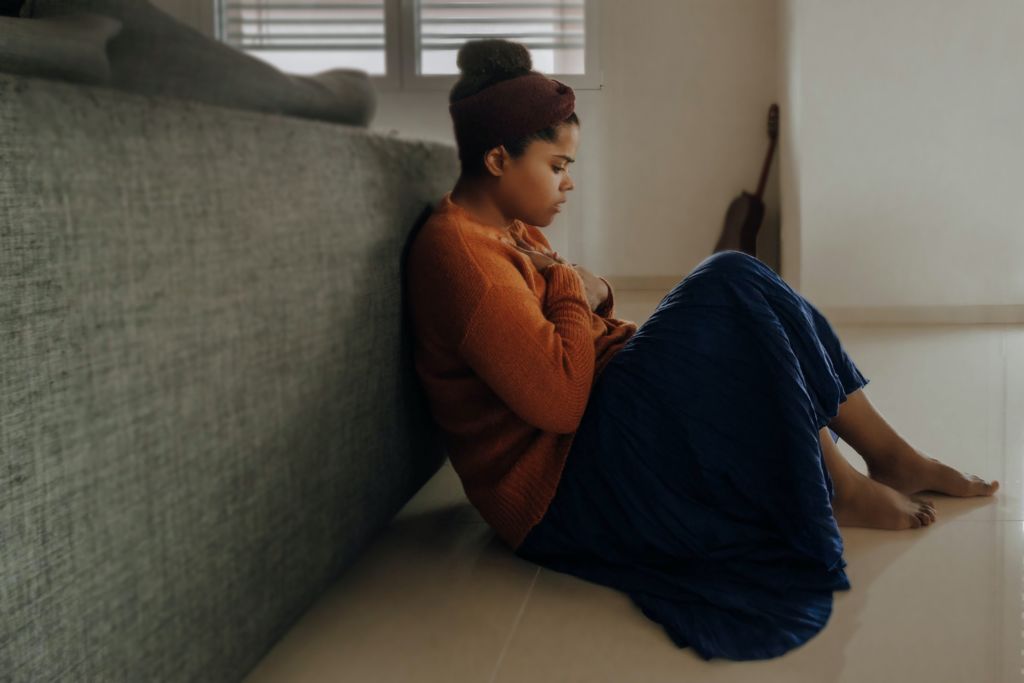Since anxiety is a mental health condition, it may seem reasonable to assume that mental or emotional symptoms, rather than physical ones, predominate. However, somatic symptoms, or physical symptoms, are frequently associated with anxiety. The opposite may also be true for some people, who may notice more physical symptoms than emotional ones. Irvine Christian Counseling can help you explore and address both the mental and physical impacts of anxiety.
Anyone who has ever experienced anxiety can probably name many typical physical symptoms, including:
- trembling or swaying
- blotchy skin
- increased perspiration
- nausea
- beating heart
 However, those who suffer from long-term anxiety disorders, such as panic attacks, phobias, generalized anxiety disorder, or social anxiety, may exhibit more enduring symptoms, even in the absence of a trigger.
However, those who suffer from long-term anxiety disorders, such as panic attacks, phobias, generalized anxiety disorder, or social anxiety, may exhibit more enduring symptoms, even in the absence of a trigger.
Some people might not be aware of the severity of their distress because these symptoms can resemble those of serious medical conditions. Instead, they might be concerned that they have heart problems, recurrent migraines, or other health problems. As a result, these physical symptoms frequently contribute to long-term confusion and stress about the real cause of symptoms, in addition to possibly causing immediate distress.
Understanding how anxiety affects the body can make it easier for people experiencing physical symptoms to identify anxiety.
Seven physical symptoms of anxiety
People who suffer from anxiety may also experience the physical symptoms listed below in addition to their mental health issues. Anxiety can result in a wide range of physical complaints.
1. Anxiety and lightheadedness.
Anxiety frequently manifests as dizziness. You may experience:
- Lightheadedness.
- Being off-balance, especially in open or crowded spaces.
- A feeling of spinning or rocking back and forth.
There can be a positive feedback loop between anxiety and lightheadedness. Every time they feel dizzy, people who worry about losing their balance, falling, or losing control in a public setting may become anxious, and one symptom may make the other worse.
worry about losing their balance, falling, or losing control in a public setting may become anxious, and one symptom may make the other worse.
This, according to research from the Academy of Neurologic Physical Therapy, occurs when the limbic system, which helps control emotional experiences, interacts with the vestibular system, which helps control sensations of movement in your environment and the position of your body.
Many people find that avoiding physical activity or situations that are likely to cause anxiety or stress is a good way to cope with these fears. Over time, this might have a detrimental effect on one’s quality of life.
2. Anxiety and pain in the chest.
One anxiety symptom that frequently raises concern is chest pain, especially when it is accompanied by a sharp rise in heart rate and shortness of breath. The fact that these symptoms can also indicate a heart attack causes many people who experience chest pain to fear for their lives. When there is no medical explanation for their pain and heart palpitations, they may become frustrated and distressed and seek emergency medical attention.
However, a study of 151 patients with chest pain found that 59% of them also displayed signs of anxiety. According to research from 2006, anxiety is more common than a cardiac condition in people who seek emergency care for chest pain. Particularly panic attacks may resemble a coming heart attack in many ways.
However, a person having a heart attack will likely feel a squeezing pain that could extend to their jaw or left arm. Women frequently experience pain in their shoulders or upper back.
3. Headaches and anxiety.
Both tension headaches and migraines have been associated with anxiety by experts. There are a variety of reasons why headaches can develop as a symptom of anxiety, including:
Sleep disturbances. Since anxiety frequently coexists with insomnia and other sleep disorders, many people who experience anxiety don’t get enough sleep. Sleep deprivation or disruption can cause a migraine.
Low serotonin. The neurotransmitter serotonin may assist in regulating emotional health, according to some research. Serotonin deficiencies may be a factor in the development of mental health conditions like anxiety. Additionally, a sudden drop in serotonin levels may cause your blood vessels to constrict, which can cause headaches.
Generalized stress. Anxiety can be exacerbated by stress, particularly if you feel overburdened and unsure of how to handle the situation. Muscles can become repeatedly tense as a result of stress or anxiety, and this persistent muscle tension frequently results in headaches. But it’s also known that stress can cause migraines.
4. Anxiety and digestive problems.
 Consistent stomach discomfort is a common physical sign of anxiety. According to medical research, this occurs as a result of the brain-gut connection. Shared nerves between the gut and the brain have the potential to interact negatively, impairing routine bodily functions.
Consistent stomach discomfort is a common physical sign of anxiety. According to medical research, this occurs as a result of the brain-gut connection. Shared nerves between the gut and the brain have the potential to interact negatively, impairing routine bodily functions.
Most people have experienced “butterflies” in their stomachs or nausea when anxious or concerned. However, those who experience chronic anxiety may become aware of graver problems, such as:
- Stomach cramps or pain that persists/
- Vomiting or diarrhea.
- Constipation.
- Appetite shifts.
- Ulcers.
- Irritable bowel syndrome has gotten worse (IBS).
Anxiety and emotional distress can be exacerbated by worries about having symptoms like vomiting or diarrhea in public. Some people may even find it difficult to function normally as a result of long-term GI distress, which can have a significant negative impact on their quality of life.
5. Trouble breathing and anxiety.
When feeling anxious, many people have breathing issues. Hyperventilation, or breathing that is happening too quickly, choking sensations, and difficulty breathing are all examples of breathing problems.
Usually, these symptoms disappear after a short while. They typically take place whenever there is tension, fear, or nervousness present. It’s common to experience choking during a panic attack and to think you’re having trouble breathing. These emotions can be extremely frightening, and they frequently make the emotional symptoms of anxiety worse.
6. Nervousness and anxiety.
Physical symptoms of anxiety can also include tingling or numbness. This anxiety, which is frequently described as pins and needles, frequently occurs in the hands, arms, legs, or feet of anxious people.
According to experts, it takes place in response to bodily arousal. When the body perceives a threat, anxiety symptoms begin to manifest. The body diverts its resources, like blood, away from the extremities and toward the more vital organs, like the heart, in response to this perceived threat.
Numbness and tingling can also be caused by hyperventilation. When you hyperventilate, your blood becomes overly oxygenated. The body doesn’t produce enough carbon dioxide to keep up with normal processes because of the excess oxygen present.
As a result, blood vessels tighten, and the body stops supplying vital organs like the hands and feet with blood. This lack of carbon dioxide can also cause additional symptoms, such as headaches, elevated heart rate, and lightheadedness.
7. Anxiety and persistent pain.
The connection between anxiety and chronic pain is supported by a wealth of scientific data.
According to a 2013 study, of 250 people who reported having chronic pain, 45% also displayed signs of at least one type of anxiety. In comparison to those who did not have anxiety symptoms, chronic pain patients with anxiety symptoms typically had more pain and a lower quality of life.
People who experience both chronic pain and anxiety frequently have a lower pain threshold and get caught in an upsetting cycle of symptoms. Those who are in constant pain might:
- Feel depressed and concerned about suffering more pain.
- Avoid moving around when you are in pain because it makes it difficult to do things that could ease anxiety symptoms.
- Become concerned about their capacity to handle obligations as a result of pain.
Depression has also been connected to long-term chronic pain. People who experience chronic pain and anxiety frequently experience depressive symptoms as well.
Permanent impact of anxiety
Because the body believes it is about to face a serious threat, anxiety symptoms start to appear. The “fight-or-flight” response causes bodily changes that cause physical and emotional symptoms. As soon as the body switches into this mode, hormone levels in the bloodstream rise above normal, resulting in the well-known symptoms of anxiety.
mode, hormone levels in the bloodstream rise above normal, resulting in the well-known symptoms of anxiety.
Consequently, problems can arise when anxiety triggers the body’s fight-or-flight response too frequently or for too long, which can happen when you have trouble managing anxiety symptoms. Anxiety serves an important purpose in preparing the body to deal with threats in the environment.
According to medical research, the following conditions and long-term anxiety may be related:
- Cardiovascular diseases and heart attacks.
- Elevated blood pressure.
- Rheumatoid bowel syndrome (IBS).
- Issues with the respiratory system, such as chronic obstructive pulmonary disease.
In conclusion, people who have anxiety, especially those who have it untreated, don’t just have its immediate physical and emotional symptoms. Over time, their general health may also deteriorate.
Can therapy help relieve the physical symptoms of anxiety?
Therapy can help people manage their physical symptoms of anxiety, in addition to addressing its emotional effects. All symptoms, whether physical or mental, will typically improve when the causes and triggers of anxiety are addressed. Contact us at Irvine Christian Counseling today and speak to a counselor who can help you with anxiety.
-
Kate Motaung: Curator
Kate Motaung is the Senior Writer, Editor, and Content Manager for a multi-state company. She is the author of several books including Letters to Grief, 101 Prayers for Comfort in Difficult Times, and A Place to Land: A Story of Longing and Belonging...
DISCLAIMER: THIS ARTICLE DOES NOT PROVIDE MEDICAL ADVICE
Articles are intended for informational purposes only and do not constitute medical advice; the Content is not intended to be a substitute for professional medical advice, diagnosis, or treatment. All opinions expressed by authors and quoted sources are their own and do not necessarily reflect the opinions of the editors, publishers or editorial boards of Irvine Christian Counseling. This website does not recommend or endorse any specific tests, physicians, products, procedures, opinions, or other information that may be mentioned on the Site. Reliance on any information provided by this website is solely at your own risk.





